
Atlas F1 GP Editor
At the age of 22, Antonio Pizzonia was a promsing young driver about to make his debut in Formula One. Less than a year later, he was without a chance of getting a seat, after an abysmal season at Jaguar, that ended prematurely when the Ford owned team fired him for under-performing. A year later, the Brazilian's stocks are once again on the rise. Frank Williams, Sam Michael, Juan Pablo Montoya and Pizzonia himself tell David Cameron how the 24-year-old managed to recover his reputation. Exclusive for Atlas F1
In March 2003 he was living the dream - he was lined up on the grid in Melbourne, Australia, for his first ever Formula One race. Ten races later the dream was over - Jaguar announced that they had fired Pizzonia, after an earlier aborted attempt to rid themselves of him, and amid rumours of rancourous backroom fights and unequal equipment. The young Brazilian retreated from public view to lick his wounds - in the eyes of the public he had gone from the new boy wonder to a has-been in effectively six months.
It was a brutally tough time for the young driver. "Yeah, for sure it was difficult," Pizzonia reflects over a year later. "I was in contact with Williams, and I knew they still believed in me, but it was pretty hard." Making an appearance at the paddock for the first time in Indianapolis last year, he had very valid fears for the future at a time when it was uncertain whether he would even be able to reclaim a test seat, with that position under debate by the FIA and the teams.
Frank Williams, succinct as ever, gave his reaction to the poor form in a green car of a driver he had personally rated very highly before the move thus: "It did surprise us, and no it didn't change our perception (of his abilities), but of course that was in a different car to ours. All we knew was that when he's driving a Williams BMW he's very competitive - whether it's testing or racing, his application is exactly the same."
All Pizzonia could do was push and hope. Ahead of the season ending race in Japan last year Williams gave him a few days of testing at Jerez to help set up the car, and the results were impressive - his feedback was as good and concise as ever, and while he was there, he also set a new track record in the hybrid car. He had put down a marker - his speed was still there, despite the nightmare of his time with Jaguar.
"There were a lot of things going on at Jaguar," Pizzonia recalls. "I don't really want to go back to that - for me it's part of the past - but it was very frustrating for me. Right from the very start things went completely wrong with the team - things just seemed to happen that didn't help much, and I think the team didn't help me much either. I was always trying to do my best, but really they wouldn't let me. I think I wasn't really treated very well there, and also there was a real lack of money to do anything, even to run two cars properly - I guess you can see those money problems now.
"Still, I did learn a lot there, and I've managed to put it behind me and move on. I had a few bad times there, but even with that I think I learnt a lot at Jaguar, and right now I'm just looking to the future, looking ahead."
Williams' Technical Director Sam Michael has a different theory of why the driver he knew so well had failed to impress in his time with Jaguar: "Maybe it was just starting racing. If you look at most guys it does take them six to twelve months to learn the tracks and how to deal with the team situations, and maybe it's just down to that. I didn't work at Jaguar, so I can't really comment on it, but maybe it was just that it was his first year.
"If you go right back to the end of 2001, when we first tested him, it was pretty clear that he was talented right away, so we gave him the test drive for 2002, and there were no fewer than five or six times where he was exceptional compared to Juan Pablo [Montoya] and Ralf [Schumacher] in terms of talent. Even Ralf himself had followed him on a few laps and said ‘look, this guy is really good, he knows how to drive a car and knows the right lines, you can see from the car that he's good', and that's quite rare for one driver to say that about another driver.
"So we really thought, and not because of what the drivers said because that was a tiny thing, most of the time it was because of his pace that we thought this guy is going to be really good."
Nonetheless, the Jaguar period had blotted Pizzonia's copybook in the eyes of the then Chief Operations Engineer, who had formerly been a big supporter of the Brazilian. "Obviously he didn't do a good enough job at Jaguar; Mark Webber outperformed him there, and we went through a period of probably twelve months, from the middle of 2003 to the middle of 2004, where we almost thought he wouldn't do a good job as a race driver.
"I certainly didn't - I was a big, big fan of his in the middle of 2002, and he sort of faded in my eyes; I told him as much and said that he hadn't performed well enough. We told him there were a lot of things we weren't happy with, but then he himself was left to his own devices to fix that. At the end of the day we put a lot of encouragement into him in 2002, and we weren't prepared to do it again - I certainly wasn't, and neither were Frank and Patrick.
"So we said ‘here's a one year testing deal - it's up to you - you're the one that has to sort it out, as we don't have the time to invest in you like before', and he did do it himself. He obviously felt as though he had a rough time there (at Jaguar), but we explained to him before he started working for us again that basically we wanted him to approach everything positively, we weren't interested in what type of problems he had there as such, and that if he was to drive for Williams he had to do it positively and just get on with it basically, and not dwell on anything that happened in the past.
The period was a godsend for Pizzonia. "Yeah, it was really important for me, first to get back in a car and realise how good I can be for myself, and then to just get back in the team and gain some more experience after one year away to see how they had improved too. When I came back there were so many new things on the car - it was really amazing! But mostly it was important to just get back in the car, and I've done quite a lot of miles in testing this year, which is great - I really love driving, and it's the best way to learn everything to do with the car.
"I knew I had a lot of support from Williams over the years, even when I was at Jaguar, and that's always been great. To be honest it was really good to come back to Williams because I've always loved them as a team - ever since I was nine or ten I've dreamed of being with the team.
"And it was a dream come true to race for them."
The odds were stacked against Pizzonia ever returning to a race cockpit again - a one year testing contract more often than not becomes a temporary reprieve before the slow slide back down the motorsport pile - but he plugged away in testing and quietly hoped. After Ralf Schumacher was injured following a high-speed crash in Indianapolis this year, the team turned to third driver Marc Gene to take over the reins - he had done a more than adequate job filling in for the German the year before after another crash in Monza, and contractually was the first port of call for the team.
But after two races it was clear that the Spaniard wasn't the answer - the team won't say it, but it is obvious from his lap times during those two races that Gene just wasn't quick enough. With Schumacher still recovering, there were two options - pull in a driver from outside and hope for the best, or put their hopes on Pizzonia, who clearly knew the car well after thousands of testing kilometres, having regained his racing chops.
Pizzonia got the call.
But how good was Pizzonia's racing performance over the four race period?
"I think it was pretty good, you know," Pizzonia says. "Things were good and it went pretty well, really. I think I managed to be better than a lot of people expected, which was important, and it was a good experience. It also gave me more time in the car, which is always good. I just wanted to score some points, really - there wasn't a lot more I could do than that with the car. It would have been really easy to look a bit silly, and it was important for me not to try and be a hero but really to just go out and do the job as well as I could.
"Certainly the team asked me to just go out and try to bring back some points. I think I performed pretty well in the car over the four races - okay, in terms of points not really, because I didn't finish in one race. There are a few reasons why I didn't, and they weren't anything to do with me, so really I think I achieved what I wanted mostly."
"He definitely outperformed our expectations and scored good points for the team in those races," concurs Sam Michael. "He scored two points in each race that he finished, and he would have been third in Spa before his gearbox stopped his race. In those races he did a good job. In his first race in Hockenheim he didn't do a good job in the main qualifying session, but it wasn't bad considering he hadn't raced for twelve months or so, and from that point on he didn't get it wrong again - for the next three races he always had more fuel than his teammate, and in a couple of races he outqualified him. He did a good job."
Frank Williams was, too, impressed with Pizzonia's comeback. "We were very surprised at his immediate level of performance," the veteran team chief says. "He rarely made a mistake, and he unquestionably improved race by race. We had a direct comparison with Juan, and he compared very favourably in that comparison."
"I think I proved a point," Pizzonia adds. "Especially inside of the team - not so much outside of the team, because from the outside you don't really see the real picture, for example the fuel loads you're carrying in qualifying and all those things. There were times when I had more fuel than Juan Pablo - sometimes much more, like in Hungary, where I was three or four tenths faster (in qualifying) I think, and yet I didn't stop for about another four laps - people don't really look at those things from the outside, but for sure I think the team was pretty impressed with me for those reasons."
Michael: "Probably his results didn't reflect how quick he was. Look at Spa and Monza - his pace in Monza was pretty good, he got punted off on the first lap but was the fastest Michelin runner by over three tenths, and in Spa he was headed for a podium until his gearbox failed, so the final results don't reflect what type of job he did, whereas we did see in the car where he got to. Probably Monza was his best race, because although he only finished seventh he was punted off on the first lap and came around 35 seconds behind Rubens, and at the end of the race he was 35 seconds behind Rubens, so he didn't lose anything after 53 laps - Rubens won the race, and he didn't make any time on Antonio during the whole race. So he's really surprised everybody, surprised everyone inside Williams."
When Ralf Schumacher made his return last month, for the first ever Formula One race in Shanghai, Pizzonia's dream was over. He had proven his point, and changed a lot of opinions in doing so, most importantly those among the hierarchy at Williams. He had more than held his own against Montoya, and while a comparison with Schumacher couldn't be made ("It's impossible," Williams noted, "they're not driving in the same cars on the same tracks at the same time") there was ample proof that it was the Jaguar period which was the anomaly, not anything on either side of it.
But where does that leave Pizzonia for the future? Williams have two race drivers signed for next year - Mark Webber and Jenson Button - although the latter's contract is disputed by the driver's current team BAR, and a verdict from the Contracts Recognition Board is expected this weekend. If Williams do need to find a second driver, for whatever reason, then what are Pizzonia's chances of being considered for the seat?
"Well obviously he's got a job at Williams, and in what capacity remains to be seen," Michael says, "It's too early to say [whether he could get Button's seat], and I don't really want to go into it. Yeah, it's not something that we're … well, we're putting everything into winning at the CRB, and if that doesn't come off then we'll look at things like that."
Pizzonia himself expects to continue testing for Williams next season, while harbouring the hope that luck would again offer him a chance to return to racing.
"I really want to race," Pizzonia admits. "You never know - if Jenson doesn't end up coming back to Williams then maybe I'll get a chance to race for them again. Unfortunately there's not many seats in the top teams anymore, so if I don't race for Williams I'll test for them - I've got that contract already. In a way I wish that the races I had were a bit earlier in the season, because maybe I could have had more chances at a race seat with the other teams, or maybe even with Williams as well."
If, for whatever reason, Williams do find themselves with Pizzonia in a race seat again, they now know what he can do - he's young, fast, knows the car well, has dealt with adversity and come through the other side, and has proven his abilities in front of the world.
Pizzonia himself isn't getting carried away. "I think that I've just got a lot more experience of everything," he notes, smiling. "I'm still young, I've just turned 24, and in a way I've still not got enough experience in some ways, but I think I'm learning something every day and improving all the time.
"I think you have to remember that I've only had 15 races, so of course there will always be more to learn and experience. When I went back to Williams I actually still felt like a newcomer, with so much to learn - in Formula One experience is so important; but I'm getting there."
And so, at the age of twenty four, Antonio Pizzonia may just be a Formula One driver once again.
At the age of only twenty three, Antonio Pizzonia was an ex-Formula One driver.
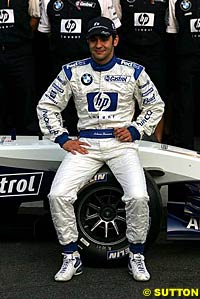 He did everything he was told to do to get there, and initially it worked. He knew he had to leave his family behind in the Amazonian town of Manaus, Brazil, and he did. He then had to fight through the junior ranks at home and in England, against drivers with bigger budgets and more impressive names, and he did. In doing so he impressed to such an extent that a test seat with Williams fell to him, which then translated into a race drive with Jaguar.
He did everything he was told to do to get there, and initially it worked. He knew he had to leave his family behind in the Amazonian town of Manaus, Brazil, and he did. He then had to fight through the junior ranks at home and in England, against drivers with bigger budgets and more impressive names, and he did. In doing so he impressed to such an extent that a test seat with Williams fell to him, which then translated into a race drive with Jaguar.
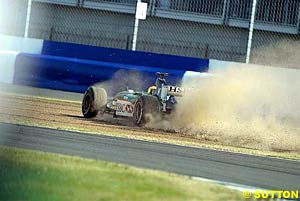 "He took a hard knock as you say," Frank Williams adds, "and I'm sure his pride and his reputation caused a rethink of his approach; he certainly came back [to Williams] a wiser and a more experienced character."
"He took a hard knock as you say," Frank Williams adds, "and I'm sure his pride and his reputation caused a rethink of his approach; he certainly came back [to Williams] a wiser and a more experienced character."
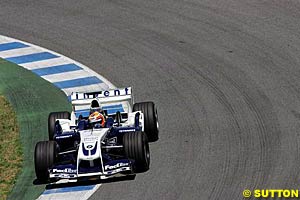 "And I must say that he did do that - since the end of last year when he was back with Williams he didn't concentrate on any of that, and he just got on with the job. He took it onboard, came back to testing and then racing with us, and proved to everyone that he could do the job."
"And I must say that he did do that - since the end of last year when he was back with Williams he didn't concentrate on any of that, and he just got on with the job. He took it onboard, came back to testing and then racing with us, and proved to everyone that he could do the job."
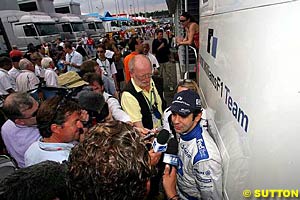 "It was a really, really special moment for me, for sure," Pizzonia smiles broadly at the thought. "I knew that I'd really have to perform, as it could be my last chance to race in Formula One, so there was a lot of pressure but I really just wanted to prove to everyone what I could do if I had the chance. The good thing was I knew there was a lot of support for me from the team, and I knew the car really well, and the tracks, so I was pretty confident I could do alright. I think I managed to impress a few people."
"It was a really, really special moment for me, for sure," Pizzonia smiles broadly at the thought. "I knew that I'd really have to perform, as it could be my last chance to race in Formula One, so there was a lot of pressure but I really just wanted to prove to everyone what I could do if I had the chance. The good thing was I knew there was a lot of support for me from the team, and I knew the car really well, and the tracks, so I was pretty confident I could do alright. I think I managed to impress a few people."
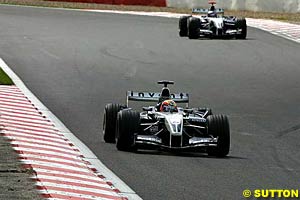 "Antonio was very hard," agrees Montoya. "He was quite impressive, especially his pace. He needs a bit more experience, but his pace was flying in the races; it was very, very fast."
"Antonio was very hard," agrees Montoya. "He was quite impressive, especially his pace. He needs a bit more experience, but his pace was flying in the races; it was very, very fast."
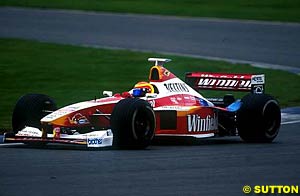 "Certainly he would be on our list," Frank Williams clarifies. "Since December 2001 he's done tens of thousands of kilometres of testing, he has thereby accumulated a substantial knowledge of what makes racing cars go tick and which are the quick ways around Grand Prix circuits, and he has learnt what not to do. That is not to say he hasn't got much more to learn, but I think if he is in a good team, if he finds himself on a good team he could be capable of winning races in due course."
"Certainly he would be on our list," Frank Williams clarifies. "Since December 2001 he's done tens of thousands of kilometres of testing, he has thereby accumulated a substantial knowledge of what makes racing cars go tick and which are the quick ways around Grand Prix circuits, and he has learnt what not to do. That is not to say he hasn't got much more to learn, but I think if he is in a good team, if he finds himself on a good team he could be capable of winning races in due course."
|
Contact the Author Contact the Editor |
Please Contact Us for permission to republish this or any other material from Atlas F1.
|
Volume 10, Issue 41
Atlas F1 Exclusive
How Pizzonia Recovered his Career
Ann Bradshaw: Point of View
2004 Japanese GP Review
2004 Japanese GP Review
Technical Review: Japan
Dear Ralf
The One-Day Weekend
Stats Center
Qualifying Differentials
SuperStats
Charts Center
Columns
Season Strokes
On the Road
Elsewhere in Racing
The Weekly Grapevine
> Homepage |